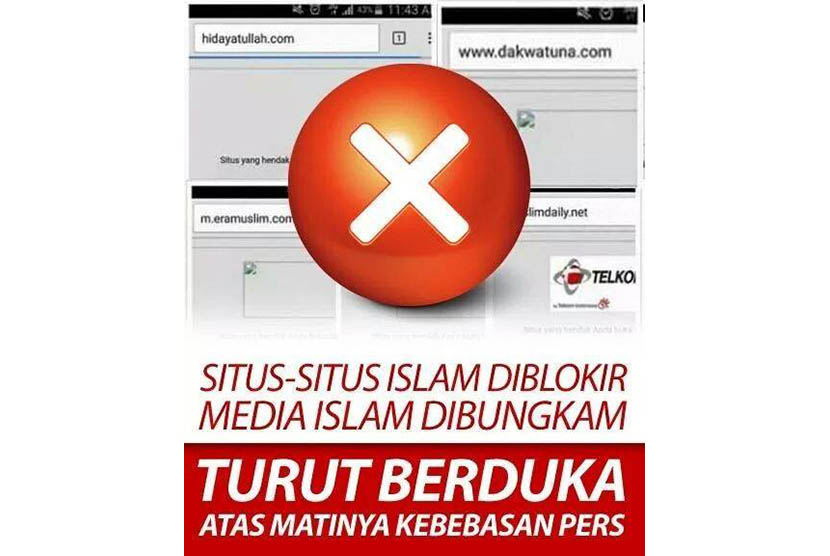REPUBLIKA.CO.ID, JAKARTA -- The government has lifted restrictions on 12 out of 19 Islamic websites that were blocked recently for allegedly promoting radicalism.
After the Forum for Handling Websites carrying Negative Contents (FPSIBN) conducted a meeting on terrorism, SARA (ethnicity, religious, racial and group), and hate issues here on Thursday, the deputy chairman of the FPSIBN, Agus Barnas, said the operation of 12 websites will be normalized, but they will be under supervision.
"We are restoring only 12 out of 19 blocked websites because only their operators communicated with the forum and that showed their goodwill, besides a dialog that has happened with them regarding the importance of maintaining the integrity of the Unitary State of Indonesia," he stated.
The 12 websites that have been unblocked are hidayatullah.com, salam-online.com, aqlislamcenter.com, kiblat.net, gemaislam.com, panjimas.com, muslimdaily.net, voa-islam.com, dakwatuna.com, an-najah.net, eramuslim.com, and arrahmah.com.
According to Barnas, his side is waiting for the operators of the remaining seven websites to communicate with them.
"We will wait until communication happens. We may open their sites based on the panel's considerations," he added.
The secretary of FPSIBN, Azhar Hasyim, remarked that following the decision of the forum, he has started normalizing the operation of the websites by erasing their names from the database of the positive trust, adding he will later inform all internet service providers concerned.
"God willing, the lifting of blocks will come into effect from tomorrow. It is a process," he noted.
The seven websites that remain blocked include ghur4ba blogspot.com, thoriquna.com, muqawamah.com, daulahislam.com, and dakwahmedia.com.
The meeting of the panel was attended by its eleven members, Agus Barnas, Ashara Hasyim, FPSIBN spokesman Tjipta Lesmana, sociologist Thamrin Tomagola, and Arief Muliawan, a representative from prosecutor's office.
Other participants were Asep Saefullah, a representative from the Alliance of Independent Journalists, KS Arsana from the Hindu Dharma Council, Alim Sudio from the Walubi Budhist Council, Uung Cendan from Matakin (Confucianism), Sony Hendra Sudaryana from the Directorate General of Informatics and Applications.
The blocking of the Islamic websites had drawn criticisms from various quarters including Islamic figure Din Syamsuddin.
Din Syamsuddin, who is also the chief of the Indonesian Council of Ulemas (MUI), on Tuesday expressed his disappointment over the blocking, saying, "the National Counterterrorism Agency (BNPT) should not have acted like that. Blocking websites will only spread more radicalism because it causes disappointment. It is not impossible that after blocking 22 websites, 22 thousand more will not emerge."
The government was too hasty in blocking the websites, he stated, adding, "No dialog was carried out before taking the action and the websites were blocked all of a sudden. The move was executed without any prior notice or holding consultations with parties concerned."
Syamsuddin deplored the action and called it unwise. According to him, the blocked Islamic websites were moderate and not connected to the violence that the BNPT accused them of.
"There are a lot of other websites that carry negative content, including several that attack Islam, and need to be dealt with. There are provocative and pornographic websites as well," he pointed out.
Syamsuddin hopes that the government, through a number of its ministries and institutions, will be more careful while handling Islamic websites because if it acts in haste, it will encourage a repressive attitude against democracy.
"The government cannot just implement such a move without giving prior notice. This was like a hit-and-run act. It was repressive. It would have been better if the government issued a summons before taking the action. The government's actions should not damage the harmony in communities," the MUI general chairman observed.


